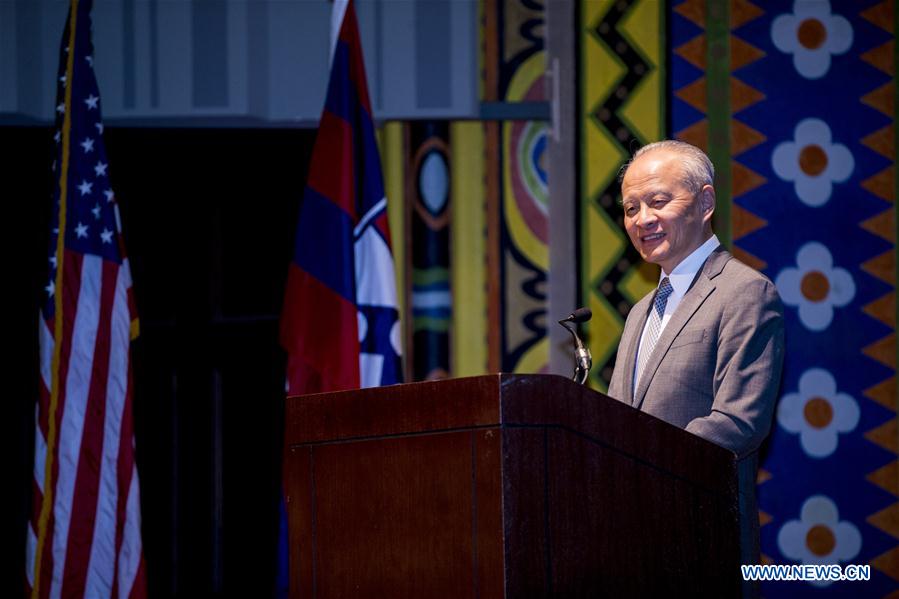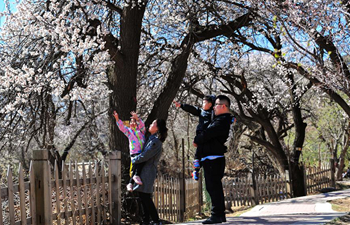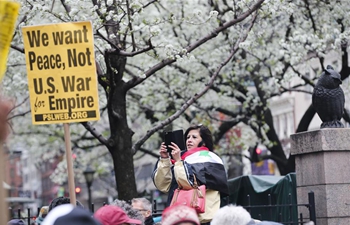
Chinese Ambassador to the United States Cui Tiankai addresses the 2018 Penn Wharton China Summit in Philadelphia, the United States, April 15, 2018. Chinese Ambassador to the United States Cui Tiankai Sunday urged U.S. politicians and strategists to "make the right choice at the crossroads of history" for the world's most important bilateral relations. (Xinhua)
PHILADELPHIA, the United States, April 15 (Xinhua) -- Chinese Ambassador to the United States Cui Tiankai Sunday urged U.S. politicians and strategists to "make the right choice at the crossroads of history" for the world's most important bilateral relations.
The two countries have fallen into a trade dispute since January, with the U.S. slapping unreasonable tariffs on various Chinese commodities for exports, which aroused fears that the world's two largest economies would go into a trade war.
Cui pointed out the two countries have come to an important moment for making choices, as they will usher in the 40th anniversary of the establishment of diplomatic relations.
"I hope that American politicians and so-called strategists will not take the wrong direction, but make the right choices at the crossroads of history," Cui said in a speech at the 2018 Penn Wharton China Summit on Sunday.
HISTORIC CHOICES 40 YEARS AGO
Cui pointed out that China's choice for reform and opening up, and the U.S. decision to normalize relations with China 40 years ago were both "great historical choices," which have brought tangible benefits to the two countries and two peoples.
Coordination and cooperation between the U.S. and China on major issues of international significance have also brought many positive changes to the world, Cui said.
"Now, the choices made by China and the U.S. will not only set the direction of bilateral ties in the coming decades, but also determine how their relationship will affect the future of the two countries and the world as a whole," Cui said.
"China's choice is clear and firm," he said, "We hope that China and the United States can build a strong, healthy and stable relationship, a new type of major-power relationship featuring no-conflict, non-confrontation, mutual respect and win-win cooperation."
MISCONCEPTIONS MUST BE CORRECTED
There are some Americans who believe that the United States has suffered a loss in trade with China, Cui said, "This point of view is also untenable."
The trade volume between China and the United States was almost negligible when former U.S. President Nixon visited China in 1970s. It has grown to over 580 billion U.S. dollars last year, and two-way investment is also increasing, the ambassador said.
"This has brought great benefits to both China and the United States. U.S. companies have played an active role in the development of China. At the same time, they have also benefited greatly from China's development," he said.
The large trade deficit between the U.S. and China is attributed to many factors, including America's economic structure, low savings rates, high-tech export restrictions, he said.
"We don't want a trade war, but if anyone insists on fighting one, we will take it to the end," he noted.
The ambassador also reputed accusations that Chinese academics studying and working in the U.S. in "basically every discipline" might be covertly gathering intelligence for the Chinese government, calling it "baseless."
"This is unfair to Chinese students and scholars," Cui said, "The mutual understanding and friendship between the two peoples, especially the younger generation, determine the future of China-U.S. relations...This kind of thinking is disrespectful to Chinese students and it is also a disrespect to American schools and teachers."















